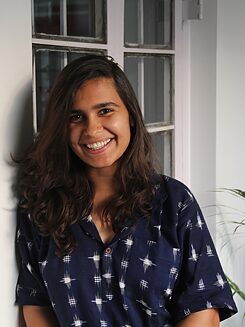 @ Rajyashri Goody
@ Rajyashri Goody
Rajyashri Goody is from Pune, India. She lives and works in Amsterdam, the Netherlands.
Goody completed her BA in Sociology at Fergusson College in Pune in 2011, and an MA in Visual Anthropology at the Granada Centre for Visual Anthropology at the University of Manchester, England in 2013.
Goody's art practice is informed by her academic background and her Ambedkarite roots. Through writing, ceramics, photography, and sculpture, she attempts to decode and make visible instances of everyday power and resistance within Dalit communities in India.
In July 2018 she had a solo show, Eat With Great Delight, at Clark House Initiative, Mumbai. Selected group exhibitions include Hungry For Time, Academy of Fine Arts, Vienna, Austria, 2021; At The Kitchen Table, One Shanthi Road, Bengaluru, 2021; Imprint After at Pulp Society, New Delhi, 2020; Sunnata Samanta at Devi Art Foundation, New Delhi, 2020; Look Outside This House at Serendipity Arts Festival, Goa, 2019; Body Building at Ishara Art Foundation, Dubai, 2019; Experiment with Truth, Sahmat, New Delhi, 2019; Within/Without, Asia House, London, 2018; Working Practices, The Showroom, London, 2018; Revelations: Reclaiming South Asian Narratives, Harvard University, Cambridge, 2018; and World Next Door, Khoj International, New Delhi, 2017. Her work has also been presented at literature festivals in India.
Goody is currently an artist-in-residence at the Rijksakademie Van Beeldende Kunsten, Amsterdam.. Her previous residencies and fellowships took place at Art Omi, Ghent; ISCP, New York; Harvard University, Cambridge; Khoj International, New Delhi; Asia Culture Centre, Gwangju; Bamboo Curtain Studio, Taipei; Piramal Art Residency, Mumbai; and TIFA, Pune. In 2018, she was awarded the Emerging Artist Award by India Today.